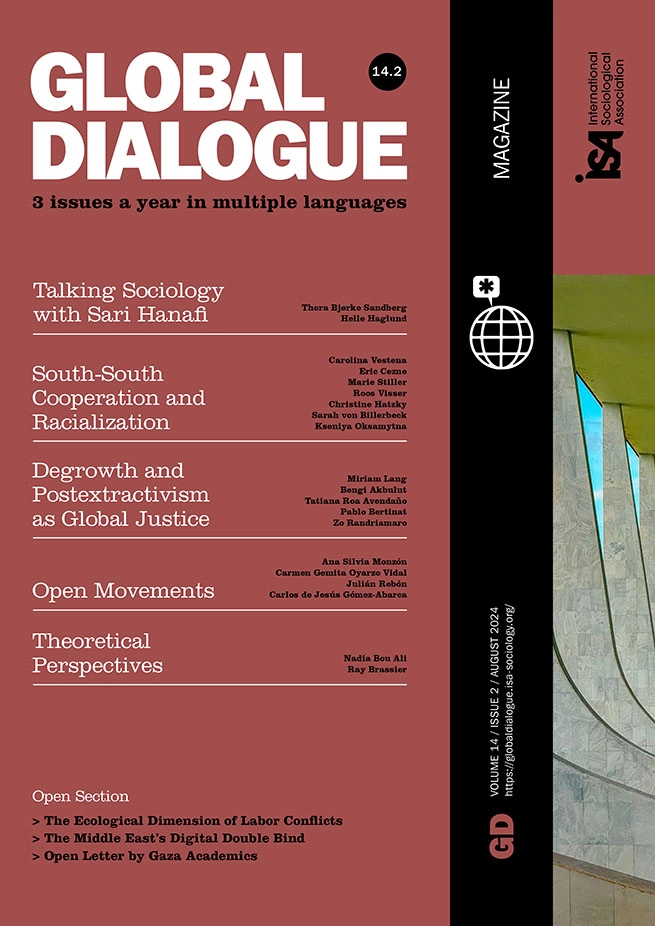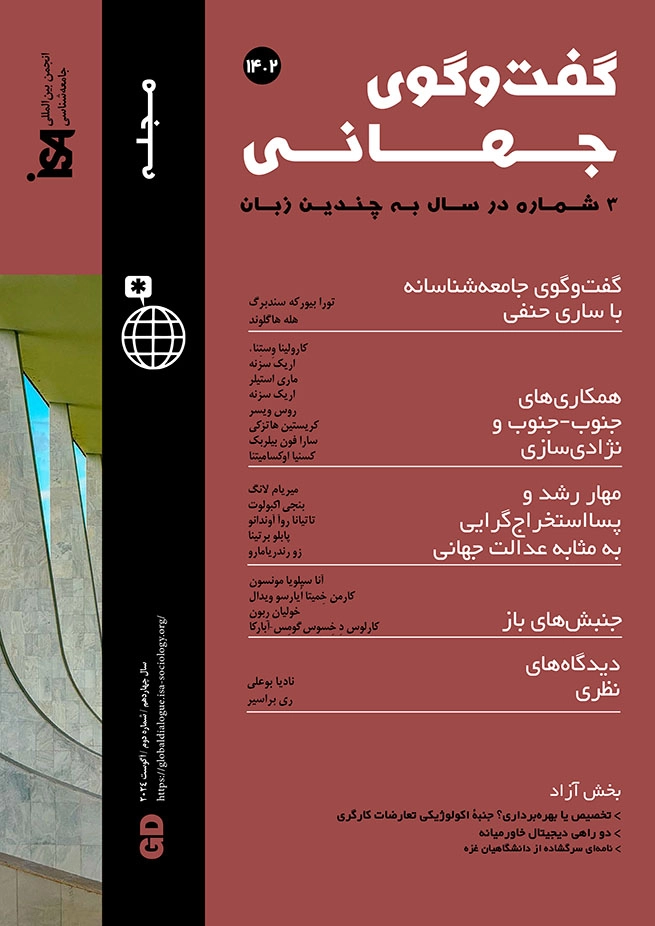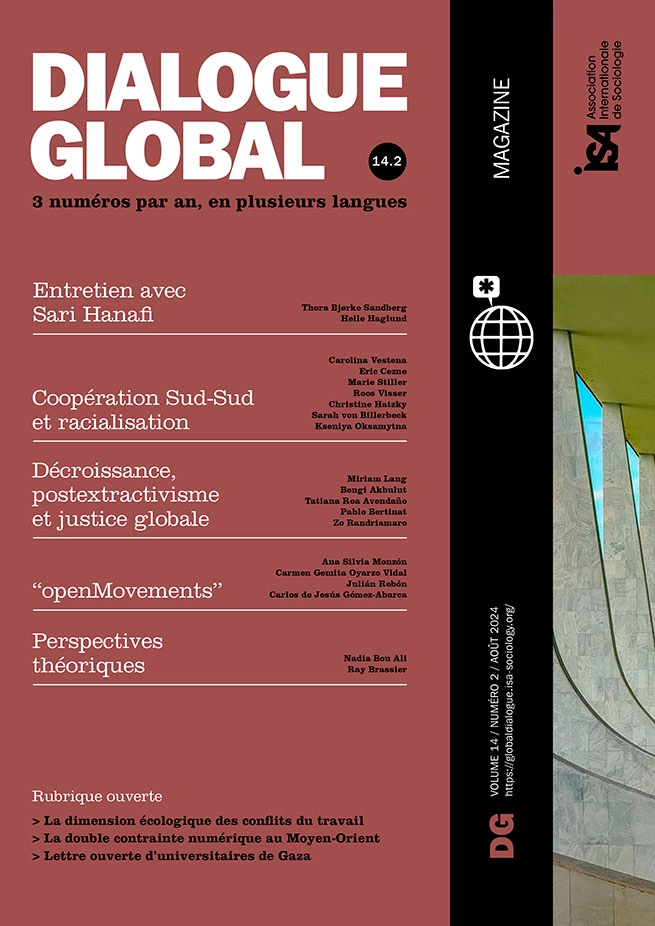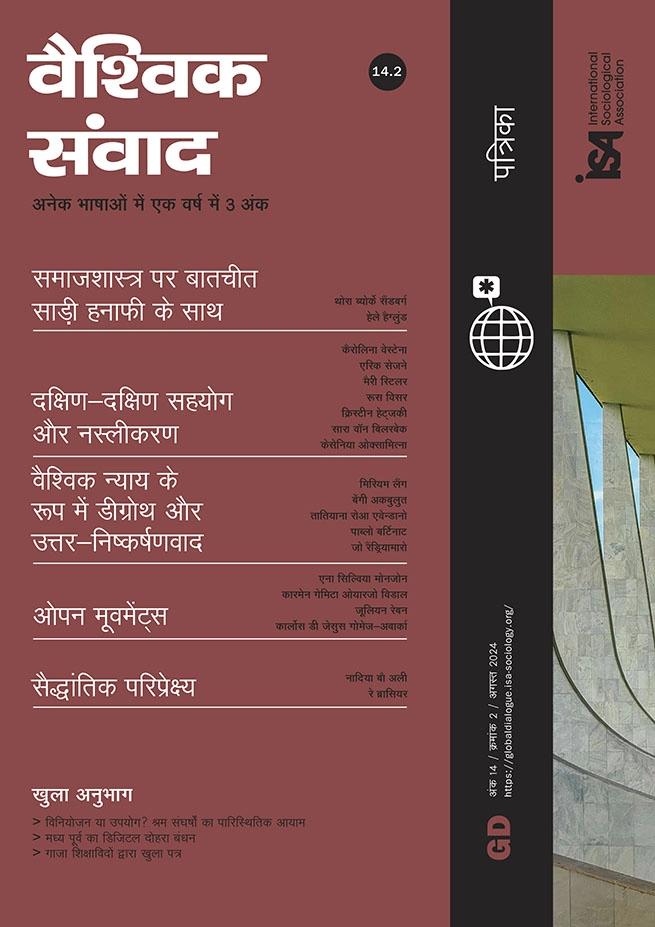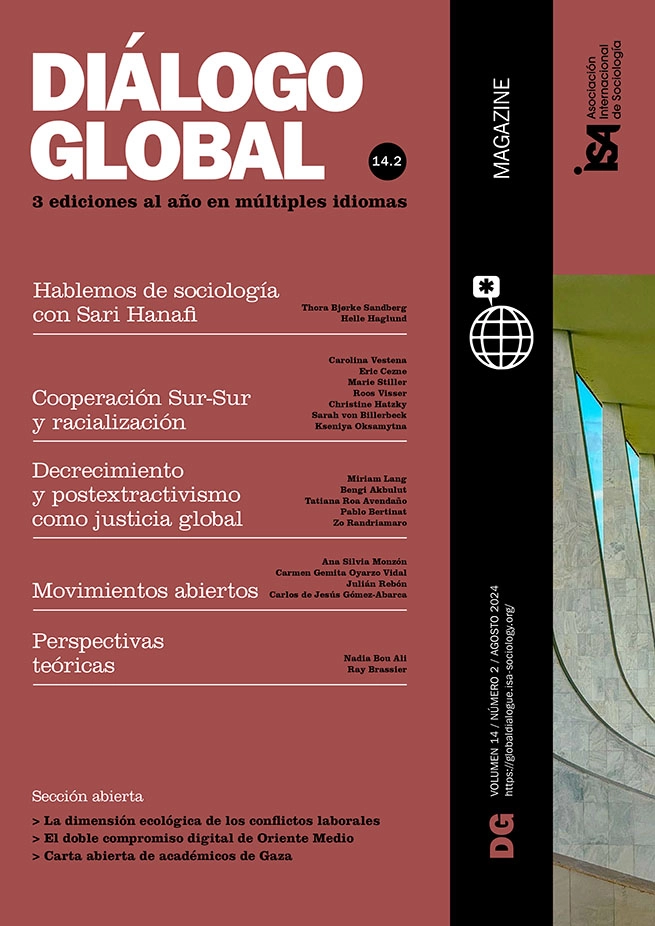This article situates degrowth as a counterhegemonic proposal that unsettles and goes beyond dominant understandings of transition. Emphasising an understanding of degrowth as one of recentring and reorienting the economy (rather than merely a matter of biophysical downscaling), I delineate three axes that are fundamental for this potential: (a) foregrounding a broader conception of what constitutes work; (b) justice, in particular regarding historical and ongoing injustices between the Global North and South; and (c) autonomy and democracy as organising principles of a degrowth economy.
Broadening our conception of ‘work’
The first axis is a broader conception of what constitutes ‘work’ beyond commodity-producing wage labour, including the types of work that are fundamental for sustaining (human and non-human) life. Feminist thinkers have long theorised this domain of labour that falls outside of, yet underlies, commodity production, that is, social reproduction. Social reproduction is firstly the work of reproducing and sustaining labourers; but it also spans the production of life-sustaining goods and services and the regeneration of the social and ecological conditions of life and (commodity) production. Social reproduction thus includes not only the forms of labour that directly produce and sustain human capacity to produce, but also those that maintain, mediate and transform biophysical processes that undergird life.
What makes social reproduction particularly distinct is that it is markedly gendered (and racialised), on the one hand, and highly invisibilised and devalued, that is, codified as ‘non-work’, on the other. This is far from being accidental: commodity production under capitalism not only hides this sphere of work and production, but fundamentally depends on its devaluation: cheap, if not entirely free, production of labourers, their sustenance and the broader ecological-social conditions of production have been instrumental for the development and reproduction of capitalism. Feminist scholarship has pointed to the global scale of the devalued and invisible value flows, drawing parallels between colonisation, domination of Nature and subjugation of women. Social reproduction is thus global and includes the work of colonies, indigenous peoples and subsistence producers, which reproduce the global labour force and protect/regenerate natural metabolic cycles. Added to this is the global division of social reproductive labour, where racialised social reproductive labour (e.g. of migrant care workers) serves to cheapen the costs of maintaining and reproducing capital accumulation, especially in countries of the Global North.
Foregrounding a broader conception of work entails, first of all, that this invisibilised sphere of labour and production is recognised, rewarded and supported. Possible actions to this end include implementing a care income, as well as expanding the rights and entitlements of essential workers and public investment into social and ecological reproduction. Such policies would not only provide material support for the workers of social reproduction but could also be instrumental in shifting perceptions of what is recognised and deemed valuable as work.
Yet recognition and validation are not sufficient for such a foregrounding. The mere recognition and validation of social reproduction, without problematising its organisation, risk perpetuating and solidifying its gendered (and racialised) distribution. A smaller social metabolism and downscaling of material and energy use carry with them important questions, such as what kind of activities will rely more on human labour, and whose labour will substitute for the reduction in energy use in, for instance, household production, agriculture or transportation. As feminist degrowthers have pointed out, given entrenched patterns of gendered division of labour, such structural shifts without ensuring gender justice run the risk of re-feminisation of social reproduction.
Crucially, feminist thinking and politics have not only been instrumental in pushing for recognising and rewarding the work of social reproduction. They have also problematised how this reproductive work is organised, that is, who will perform, how much of it, under which conditions and under whose control, if and how to remunerate it and how to decide on its distribution. In fact, for feminist politics, making social reproduction visible and to reveal it as work is not an end in itself, but rather the means for the struggle to alter its (gendered and racialised) distribution and the conditions under which it is performed. This is a critical insight, as it expands foregrounding a broader conception of work onto questions of how to organise social reproduction. Although there is hardly a blueprint, feminist scholarship and practice provide tools to tackle this question, pointing to cooperative and egalitarian forms of provisioning where labour is collective and organised along gender justice.
To recap, degrowth’s foregrounding of a broader conception of work is both a recognition and rewarding of the labour of social reproduction that is fundamental for sustaining (human and non-human) life, and a vision for its collective, egalitarian and democratic organisation. Such foregrounding provides a novel lens for thinking about transition justice, as it imbues not only the notion of transition but also that of justice with the diverse and immense field of labour and production that underpin commodity production and capital accumulation. That is to say, transition justice requires justice for (human and non-human) workers of social reproduction.
Degrowth as/through justice
The second fundamental axis is justice. Degrowth is a project of justice in two interrelated ways. Firstly, justice requires setting limits, as the social and ecological costs of growth are always unequally shared within and across societies and geographies. Downscaling of energy and resource use is a project of justice. This is especially pertinent for the Global North–Global South relations, as economic growth in the North has been driving, and continues to drive, grave socio-ecological impacts on the South. It is therefore the North’s responsibility to degrow, leaving more space for others to live.
Secondly, and more importantly, growth is driven and enabled by global injustices. The unequal relationship between the Global North and the South, which is constituted historically and continues to be reproduced, lies at the basis of global capitalism. It positions countries of the North and South differentially, where the former’s prosperity and growth has been fundamentally dependent on the flows of cheap Nature and cheap labour appropriated from the latter. The historical dynamics of global capitalism that made the Global North wealthy have also put countries of the Global South on paths that have locked them into a perpetual growth imperative, for example, through structural dependency on extractivism, debt servicing or structural adjustment.
Repairing historical and ongoing injustices is thus fundamental to degrowth and equips it with a crucial international dimension. While degrowth is predominantly a proposal developed in and for the core industrial countries of the Global North, with its associated policies and actions often envisioned as interventions within these economies, the implications of the ‘responsibility to degrow’ are by no means limited to the geographical boundaries of the Global North. Degrowth as justice is necessarily a project of addressing historical and contemporary impacts of economic growth, on the one hand, and the growth-reproducing structures of the global economic system, on the other.
Such recasting of the link between degrowth and justice is indeed central in recent degrowth thinking and activism, crystallised especially around the notions of ecological debt, that is, the historical and contemporary appropriation and/or disproportionate use of ecological resources and sinks, and ecologically unequal exchange, that is, unequal flows of embodied Nature through goods traded in international trade. Yet this needs to be complemented with the global perspective on social reproduction, which expands this notion of justice to include unequal flows of life-sustaining labour of humans and Nature between the Global North and the Global South. Seen this way, it is not only the flows of (embodied) Nature, either through direct use and appropriation or unequal exchange in global trade, but more broadly flows of social reproductive labour that sustains and reproduces capitalist growth. Actions towards repairing global injustices should therefore consider a broader notion of ‘social reproductive debt’ that includes the racialised and cheapened social reproductive labour flowing from the Global South to the North, as well as colonial reparations and giving land back to their rightful indigenous custodians.
The concrete actions and interventions that emerge from this understanding of degrowth as/through justice can be broadly categorised under three headings, which are widely congruent with the proposals made in the chapter on debt in the book The Future is Degrowth: A Guide to a World Beyond Capitalism. The first pertains to repairing historical and contemporary injustices and includes measures such as repayment of ecological and, more broadly, social reproductive debt, climate and colonial reparations, and interventions in the global financial and trade system that reverses/alleviates dynamics of unequal exchange between countries of the Global North and the South. In this sense, degrowth does not only join contemporary movements that call for reparations and indigenous sovereignty like the Land Back Movement, but also those that revive the transformational potential of the Southern Peoples Ecological Debt Creditors Alliance which had reframed the so-called debt crisis of the Third World in terms of the debt owed by the Global North.
The second set of actions/interventions relates to the potentially debilitating impacts that the contraction of production and consumption activities in line with degrowth in industrialised countries would have on the Global South, especially on countries that are structurally dependent on export or foreign investment. As the asymmetric relationship and the unequal flows and nature of labour between the Global North and the South has also historically shaped many economies in the South to be structurally dependent on export sectors, the latter would suffer in the case of a contraction in the North, amounting to a coerced delinking. Although justice-oriented measures mentioned above would provide some relief, direct measures such as transfer of resources for economic restructuring are also called for.
And the third and final set of proposals is about opening and strengthening the space for the Global South to pursue non-growth pathways if it chooses to do so. This implies recognising the validity of the variety of movements, proposals and worldviews beyond growth originating from the Global South (e.g. post-extractivism, Ubuntu, Buen Vivir) on the one hand, and measures to relieve the built-in imperative of growth in the Global South by, for instance, financing cooperative/public systems of provisioning delinked from growth or supporting a shift away from dependency on unequal exchange relations, on the other.
Degrowth as autonomy/democracy
The third and final axis is autonomy and democracy. This relates to degrowth’s call to exit a social imaginary dominated by the imperative of growth, and to foreground democratic decision-making in shaping economic processes. A counterpart to this call has been degrowth’s emphasis on autonomy. Degrowth is inspired heavily by the conceptions of autonomy (and, relatedly, democracy) developed by thinkers such as Ivan Illich, André Gorz and Cornelius Castoriadis. Despite their differences, the common ground shared by these thinkers is an understanding of how the increased scale of economic activity undermines the ability to self-govern, be it through the centralisation and bureaucratisation of economic decision-making or the erosion of the ability to self-define needs with the rise of the market economy. Endless economic growth is not desirable, even if it were biophysically possible, as it displaces the ability to collectively self-govern.
Democratising economic decision-making towards expansion of self-governance, that is, enabling all to participate in the making of decisions that affect their lives, is therefore inherent to degrowth. This is animated, firstly, in degrowth’s insistence on collective and democratic determination of situated needs and limits, that is, which activities to abolish, which ones to limit, and which activities to support and expand in a degrowth future. But it also resonates with degrowth’s emphasis on ‘different, not only less’, that is, its call for constructing a different kind of economy that serves functions that are different than one that is built on exploitation, accumulation and growth, towards one that centres needs, provisioning, equity and solidarity. Curbing corporate power, establishing democratic oversight over money and finance, participatory public budgeting, democratic governance of productive capacities as well as constructing and strengthening alternative (non-capitalist) forms of production, distribution/exchange and consumption are thus fundamental facets of degrowth.
Democratisation of economic decision-making at various scales through such interventions and practices has the potential to foreground concrete needs, use values and non-monetary wealth over accumulation, profit maximisation and growth, and prioritise principles such as ensuring sustainable and equitable livelihoods or regeneration, renewal and protection of environmental quality. Opening economic decision-making processes to democratic participation of a wider base of actors would enable the involvement of a broader range of demands and values in informing decisions regarding, for instance, what, how much and for whom to produce under which conditions, how to set prices or wages and where to invest surplus. This would open space to rethink economic imperatives such as growth or efficiency, enable the operationalisation of alternative goals, and would (re)politicise the economy by subjecting economic rationality to societal deliberation and control.
Democracy and autonomy within the economic realm are not only principles worth pursuing in themselves, but they would also function as a force to curb and transform the socially and ecologically destructive dynamics of capitalist growth economies. Degrowth’s emphasis on economic democracy and autonomy is particularly critical against the backdrop of mainstream debates on eco-social transition. The proposals within that front mostly centre on a structural reorientation of economic activities, such as shifting away from fossil fuel-based sectors, often coupled with the use of eco-efficient technologies. They reduce the question of transformation to one of getting the investments ‘right’, that is, away from ecologically destructive activities and correcting the misallocation of productive capacities. Missing from these debates, however, is a vision of how economic processes are to be governed and what kind of economic institutions are needed. This is where degrowth’s emphasis on autonomy/democracy becomes crucial, as it equips debates on transition with a problematisation of the processes of economic decision-making, in addition to their outcomes.
Bengi Akbulut, Concordia University, Canada <bengi.akbulut@gmail.com>








